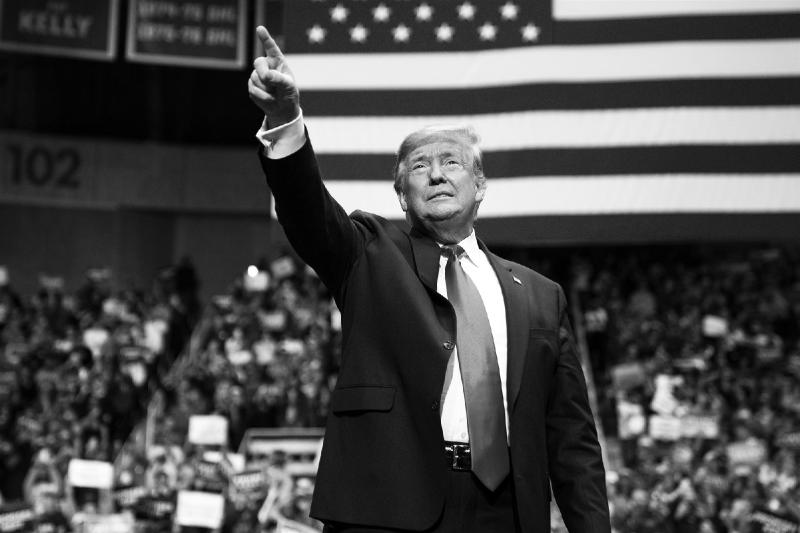Coronavirus has Trump approval ratings rising. That's not surprising — or likely to last.



President Donald Trump’s tardy and inconsistent reaction to the coronavirus crisis has drawn torrents of criticism . Even Trump administration officials and people close to the White House who usually defend his approach have expressed concern about his uneven performance in daily press briefings. The media coverage, not surprisingly, has been even harsher, filled with accounts of the bumbling news conferences and woe-is-me complaints , as he offers scant empathy over the growing number of fatalities.
With Americans holed up at home by the millions out of fear of a deadly pandemic as the economy craters, Trump’s approval ratings should be near the depths of modern presidential performance. On par, say, with President George W. Bush’s 25 percent approval rating in early November 2008 as the worst recession since the Great Depression engulfed the country. Or even President Richard Nixon’s 24 percent approval rating in August 1974 on the eve of his resignation over Watergate.
Yet Trump’s approval ratings — an important gauge of his re-election chances a bit over seven months away — are staying strong, by some counts even reaching highs for his tenure. In part, that’s a sign that no matter how much criticism Democrats lob at Trump, and whatever amount of negative media coverage he endures, his base supporters are resolute and unflinching. But the surge in support that goes beyond his base is a reflection of a familiar phenomenon whereby presidents become more popular in times of crisis, and according to history, his surge is puny — and likely to be short-lived.
A recent ABC/Ipsos poll found a majority of Americans approve of the way Trump is managing the coronavirus crisis and 55 percent approve of the way he responded to it (43 said they disapprove). That’s a considerable bump up from Trump’s average 40 percent approval rating since he took office on Jan. 20, 2017, and it shows Americans are giving the president considerable leeway to navigate the coronavirus crisis.
Rising poll numbers for a president in a crisis, however, has happened many times before, and was already a political science trend in 1970 when John Mueller first named the “rally around the flag” effect in a paper called “ Presidential Popularity From Truman to Johnson .”
Since then, we’ve seen the phenomenon at work many times. In March 1991, as President George H.W. Bush basked in the glow of the Gulf War victory, after U.S. forces successfully evicted Iraq from its occupation of Kuwait, his approval rating reached an astonishing 89 percent . That was the highest presidential job approval rating recorded since Gallup began keeping track in the 1940s.
President George W. Bush, too, saw his approval ratings skyrocket in the wake of the Sept. 11, 2001, terrorist attacks. In the immediate aftermath, Bush’s approval ratings went even a tad higher than his father’s had a decade earlier, reaching 90 percent in a Gallup poll taken Sept. 21-22.
Presidential approval ratings have risen even in murkier crises. Forty years ago, during the start of the Iran hostage crisis, the “rally around the flag” effect also kicked in strongly for President Jimmy Carter. In a Gallup poll taken on Nov. 2-5, 1979, just as the American hostages were seized by Shia Islamic extremists at the U.S. Embassy in Tehran, the percentage of people who approved of Carter’s handling of the presidency was at an abysmal 32 percent. A month later, when Carter was seen as taking a strong and resolute stand against the new revolutionary Iranian government, his approval rating shot up to 61 percent.
Yet perhaps no example better reflects how fleeting the patriotic swirl of support in a crisis can be than the denouement of the Iran hostage crisis. Once a sense of futility about resolving the embarrassing episode sunk in by late winter and spring of 1980, after a botched rescue effort , Carter’s approval ratings went into freefall. In the end, the 444-day Iran hostage crisis contributed significantly to his landslide loss to Republican challenger Ronald Reagan.



And President George H.W. Bush’s polling heights famously didn’t last either, as he lost re-election 20 months later to Democratic challenger Bill Clinton in a race largely fought over the economy and other domestic issues.
Something similar could still happen with Trump, and is in fact is likely, because battling the coronavirus is likely to be a long slog filled with accounts of death and economic destruction. American progress against the virus will also be measured against other countries such as South Korea, which has proved more effective in “flattening the curve.”